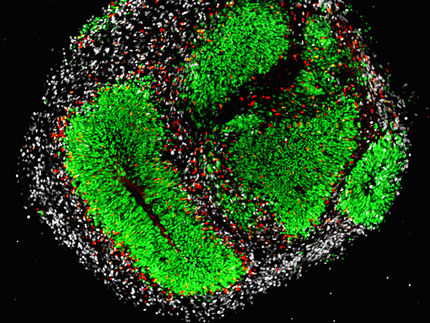Fatty acids crucial to embryonic development
Advertisement
One classical question in developmental biology is how different tissue types arise in the correct position of the developing embryo. While one signaling pathway that controls this process has been well described, unexpected findings from a team led by Carnegie's Steven Farber reveal the importance of polyunsaturated fatty acid metabolism in this process. It is published online in Developmental Cell.

This is a side-by-side comparison of a normal zebrafish embryo and a zebrafish embroy lacking ACSL4. Credit to RosaLinda Miyares.
RosaLinda Miyares.
Fatty acids serve as sources of energy, the building materials of cellular membranes, and as signals for sending messages between cells. Enzymes are needed to activate free fatty acids so that they are useful for cellular processes. The enzymes that perform this function are called acyl-CoA synthetases, often shortened to ACS.
One member of the ACS family, ACSL4, activates special fatty acids called polyunsaturated fatty acids. Mutations in ACSL4 are linked to human developmental disorders including a type of mental retardation that is linked to the X chromosome. The mammalian and fruit fly ACSL4 enzymes have been shown to play roles in brain development and embryonic survival. However, researching roles for mammalian ACSL4 in embryonic development has been confounded by the maternal delivery of polyunsaturated fatty acids to the developing embryo, as well as the need for polyunsaturated fatty acids in embryo implantation and uterus development.
Farber and his team, including lead author Rosa Miyares, collaborated with the Hammerschmidt lab at the University of Cologne Germany utilized the externally developing zebrafish to understand what ACSL4 does during embryogenesis. Miyares and her team demonstrate that ACSL4 is essential for embryos to develop with proper tissue organization. They show that ACSL4 enzyme activity regulates a specific protein in the Bmp signaling pathway, which is essential for proper embryo organization.
"We've known for some time that polyunsaturated fatty acids are important to prenatal health; in the US, these fatty acids are widely included in prenatal vitamins. By connecting polyunsaturated fatty acid metabolism with a fundamental signaling pathway in the early embryo, our study provides a clue as to why they are so critical. These results lay the groundwork for further research on polyunsaturated fatty acid metabolism and its various roles in development and disease," Farber said.























































